Related Research Articles

John Wood Campbell Jr. was an American science fiction writer and editor. He was editor of Astounding Science Fiction from late 1937 until his death and was part of the Golden Age of Science Fiction. Campbell wrote super-science space opera under his own name and stories under his primary pseudonym, Don A. Stuart. Campbell also used the pen names Karl Van Kampen and Arthur McCann. His novella Who Goes There? was adapted as the films The Thing from Another World (1951), The Thing (1982), and The Thing (2011).

The Man Who Sold the Moon is the title of a 1950 collection of science fiction short stories by American writer Robert A. Heinlein.

9 Tales of Space and Time is an anthology of original science fiction stories edited by Raymond J. Healy, published in hardcover by Henry Holt in 1954. A British edition appeared in 1955, with the title rendered Nine Tales of Space and Time. No paperback editions are reported.
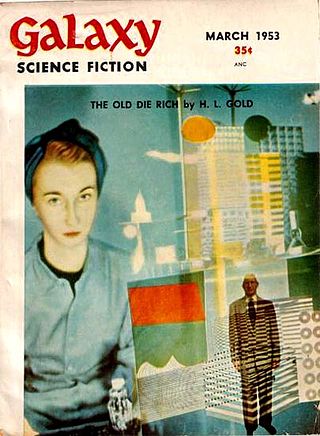
Horace Leonard Gold was an American science fiction writer and editor. Born in Canada, Gold moved to the United States at the age of two. He was most noted for bringing an innovative and fresh approach to science fiction while he was the editor of Galaxy Science Fiction, and also wrote briefly for DC Comics.

William Anthony Parker White, better known by his pen name Anthony Boucher, was an American author, critic, and editor who wrote several classic mystery novels, short stories, science fiction, and radio dramas. Between 1942 and 1947, he acted as reviewer of mostly mystery fiction for the San Francisco Chronicle. In addition to "Anthony Boucher", White also employed the pseudonym "H. H. Holmes", which was the pseudonym of a late-19th-century American serial killer; Boucher would also write light verse and sign it "Herman W. Mudgett".

The Magazine of Fantasy & Science Fiction is a U.S. fantasy and science fiction magazine, first published in 1949 by Mystery House, a subsidiary of Lawrence Spivak's Mercury Press. Editors Anthony Boucher and J. Francis McComas had approached Spivak in the mid-1940s about creating a fantasy companion to Spivak's existing mystery title, Ellery Queen's Mystery Magazine. The first issue was titled The Magazine of Fantasy, but the decision was quickly made to include science fiction as well as fantasy, and the title was changed correspondingly with the second issue. F&SF was quite different in presentation from the existing science fiction magazines of the day, most of which were in pulp format: it had no interior illustrations, no letter column, and text in a single-column format, which in the opinion of science fiction historian Mike Ashley "set F&SF apart, giving it the air and authority of a superior magazine".
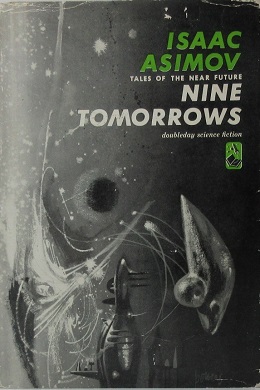
Nine Tomorrows is a collection of nine short stories and two pieces of comic verse by American writer Isaac Asimov. The pieces were all originally published in magazines between 1956 and 1958, with the exception of the closing poem, "Rejection Slips", which was original to the collection. The book was first published in the United States in 1959 and in the UK in 1963. It includes two of Asimov's favorite stories, "The Last Question" and "The Ugly Little Boy".

Unknown was an American pulp fantasy fiction magazine, published from 1939 to 1943 by Street & Smith, and edited by John W. Campbell. Unknown was a companion to Street & Smith's science fiction pulp, Astounding Science Fiction, which was also edited by Campbell at the time; many authors and illustrators contributed to both magazines. The leading fantasy magazine in the 1930s was Weird Tales, which focused on shock and horror. Campbell wanted to publish a fantasy magazine with more finesse and humor than Weird Tales, and put his plans into action when Eric Frank Russell sent him the manuscript of his novel Sinister Barrier, about aliens who own the human race. Unknown's first issue appeared in March 1939; in addition to Sinister Barrier, it included H. L. Gold's "Trouble With Water", a humorous fantasy about a New Yorker who meets a water gnome. Gold's story was the first of many in Unknown to combine commonplace reality with the fantastic.
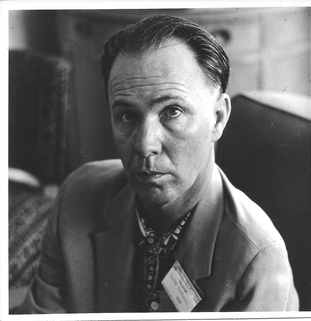
Cleve Cartmill was an American writer of science fiction and fantasy short stories. He is best remembered for what is sometimes referred to as "the Cleve Cartmill affair", when his 1944 story "Deadline" attracted the attention of the FBI by reason of its detailed description of a nuclear weapon similar to that being developed by the highly classified Manhattan Project.

NESFA Press is the publishing arm of the New England Science Fiction Association, Inc. The NESFA Press primarily produces three types of books:

Sprague de Camp's New Anthology of Science Fiction is a collection of science fiction stories by American writer L. Sprague de Camp, edited by H. J. Campbell. It was first published in both hardcover and paperback in 1953 by Panther Books.
The 57th World Science Fiction Convention (Worldcon), also known as Aussiecon Three, was held on 2–6 September 1999 at the Melbourne Convention and Exhibition Centre in Melbourne, Australia.

Kris Ottman Neville was an American science fiction writer from California.

The Black Star Passes is a fixup of science fiction short stories by American author John W. Campbell Jr. It was first published in 1953 by Fantasy Press in an edition of 2,951 copies. The book is the first in Campbell's Arcot, Morey and Wade series, and is followed by the novels Islands of Space and Invaders from the Infinite. The stories originally appeared in the magazines Amazing Stories and Amazing Stories Quarterly, and were "extensively edited" for book publication, with Campbell's approval, by Lloyd Arthur Eshbach.

In Search of Wonder: Essays on Modern Science Fiction is a collection of critical essays by American writer Damon Knight. Most of the material in the original version of the book was originally published between 1952 and 1955 in various science fiction magazines including Infinity Science Fiction, Original SF Stories, and Future SF. The essays were highly influential, and contributed to Knight's stature as the foremost critic of science fiction of his generation. The book also constitutes an informal record of the "Boom Years" of science fiction from 1950 to 1955.
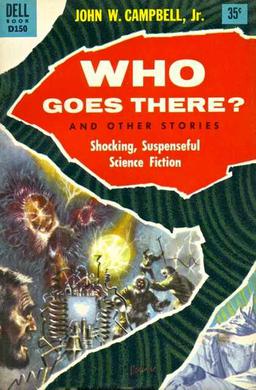
Who Goes There? and Other Stories is a 1955 collection of science fiction stories by John W. Campbell Jr., published by Dell Books in 1955. No other editions were issued.

The Paradox Men is a science fiction novel by American writer Charles L. Harness, his first novel. Initially published as a novella, "Flight into Yesterday", in the May 1949 issue of Startling Stories, it was republished as The Paradox Men in 1953. The "science-fiction classic" is both "a tale dominated by space-opera extravagances" and "a severely articulate narrative analysis of the implications of Arnold J. Toynbee's A Study of History." Boucher and McComas described it as "fine swashbuckling adventure ... so infinitely intricate that you may never quite understand what it's about." P. Schuyler Miller described it as "action-entertainment, fast-paced enough that you don't stop to bother with inconsistencies or improbabilities."
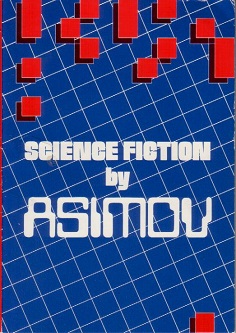
Science Fiction by Asimov is a collection of six short stories and one poem by American author Isaac Asimov. Published by Davis Publications in 1986, it was given away free to subscribers of Asimov's SF Magazine.

From Unknown Worlds is an anthology of fantasy fiction short stories edited by John W. Campbell, Jr. and illustrated by Edd Cartier, the first of a number of anthologies drawing their contents from the classic magazine Unknown of the 1930s-40s. It was first published in magazine format by American company Street & Smith in 1948; the publication was an attempt to determine if there was a market for a revived Unknown. Street & Smith printed 300,000 copies, against the advice of John Campbell, but although it sold better than the original, too many copies were returned for the publisher to be willing to revive the magazine. The first British edition was issued by Atlas Publishing in 1952; part of the run was issued in a hardcover binding. This edition omitted the story "One Man's Harp.".
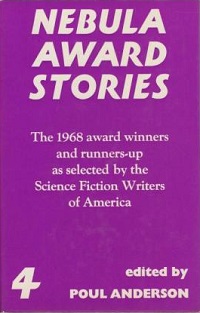
Nebula Award Stories 4 is an anthology of award-winning science fiction short works edited by Poul Anderson. It was first published in the United Kingdom in hardcover by Gollancz in November 1969. The first American edition was published by Doubleday in December of the same year. Paperback editions followed from Pocket Books in the U.S. in January 1971, and Panther in the U.K. in December 1971. The American editions bore the variant title Nebula Award Stories Four.